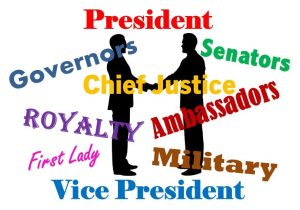 Has the casualness of our society created confusion as to the proper way to address dignitaries and/or individuals who hold high positions?
Has the casualness of our society created confusion as to the proper way to address dignitaries and/or individuals who hold high positions?
Why should you know this?
If you are doing or planning to do business internationally, adhering to a country-specific order of precedence, usage of titles, and forms of address is critical.
The best place to start understanding titles and their proper usage is in your own country!
The Congress of Vienna of 1815 agreed to rank officials by their diplomatic title and the date of presentation of their letter of credentials. For example, an ambassador accredited in April outranks an ambassador accredited in June, even if the Ambassador accredited in June represents a larger, more influential nation.
The U.S. Order of Precedence is an advisory document maintained by the Ceremonials Division of the Office of the Chief of Protocol. The U.S. Order of Precedence is not the order of succession. The President of the United States may change the order of precedence within his cabinet or government at will. *
The following examples will help you better understand precedence (priority of importance) and determine the proper way to address (introduce) dignitaries or individuals who hold a political position and in the usage of their title or honorific. Honorifics refer to the title used to address a name by the last name.
When speaking about or introducing an official of the United States abroad, it is recommended to add “…of America” as part of the title … the United States of America.
Senators are ranked according to length of continuous service. If several members took office on the same date, they are ranked alphabetically. Members of Congress also rank according to length of continuous service. If several members took office on the same date, they are ranked according to the order in which the states they represent were admitted to the Union, or they are ranked alphabetically by state.
Governors of States, when not in their state, rank according to the state’s date of admission to the Union or alphabetically by state at the option of the person or group planning the function.
Royalty in most foreign countries is ranked by birth.
Foreign Ambassadors are generally referred to as ambassadors of (name of country). There are some exceptions such as the Ambassador of the Argentine Republic, the British Ambassador, the Chinese Ambassador, Ambassador of the Netherlands.
Ambassadors are referred to in conversation as “Mr. Ambassador,” “Excellency,” or “Sir.”
Wives of ambassadors are entitled to the same rank and precedence as their husbands. They are addressed in speech as “Mrs. (last name)” or “Excellency” (never Ambassadress).
Foreign presidents, ambassadors, and cabinet ministers are usually referred to as “His” or “Her Excellency.” In conversation, “Excellency.”
“The Honorable” (not Excellency) is used by high-ranking officials in the United States.
“Madam” rather than “Ms.” is used in diplomatic circles. (FYI: “Ms.” is the preferred title used by women in the professions as opposed to Mrs. or Miss. The purpose of this usage is to bypass identifying their marital status.)
Normally, the title “Mr.” or “Madam” is added to the title of an official of the United States government: “Mr./Madam President,” “Mr./Madam Secretary,” “Mr./Madam Mayor,” “Mr./Madam Chief Justice,” etc.
The chief executive and the vice president are spoken to as “Mr. President” and “Mr. Vice President.” If the conversation is long, “Sir” may be used.
The wife of the president is referred to as Mrs. (husband’s last name), or First Lady.
Royalty titles or military ranks are included after “His Excellency.”
“Mr.” is not used with military ranks (commissioned officers). When someone has a military title and an inherited title, use the military title first. For example, Army, Marine Corps, and Air Force: General, Colonel, Captain, Lieutenant, and (last name). Navy: Admiral, Captain, Commander, Lieutenant, and (last name).
“Dr.” is used by medical professionals. People who have earned a Ph.D. or any other academic, nonmedical doctoral degree can choose whether to use the title “Dr.” both professionally and socially. It would help if you asked about their preference.
Before you can truly understand and appreciate titles as they are used in every country, you need to understand your homeland first. It’s all about honoring someone of high importance by addressing them properly. Hopefully, this blog has offered some clarifications.
This is just a sample of our Global Protocol Academy training.
RESOURCES: Although there are many books on the topic, three of our favorite resources include:
- Kiss, Bow, or Shake Hands, by Terri Morrison and Wayne A. Conaway
- *Protocol: The Complete Handbook of Diplomatic, Official and Social Usage by Mary Jane McCaffree and Pauline Innis
- Honor and Respect: Guide to Forms of Address by Robert Hickey


